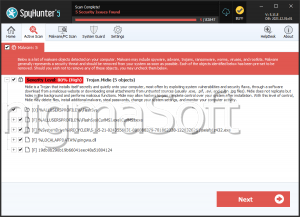Serpent Stealer
Serpent is a type of malware categorized as a stealer. This comparatively lightweight malware is designed with the specific purpose of targeting login credentials, including usernames and passwords, as well as other sensitive information. It accomplishes this by extracting data from a range of sources, including browsers and various applications.
The Serpent Stealer Exfiltrates Sensitive Information from Infected Devices
After successfully infiltrating a system, Serpent initiates the collection of pertinent device data. Within web browsers, this stealer is programmed to extract a comprehensive array of information, including browsing histories, bookmarks, Internet cookies, auto-fill data, and stored passwords.
The Serpent Stealer malware extends its reach to target login credentials and other data associated with various messaging platforms. Among these are Telegram, Discord, Tox, XMPP and Pidgin. Furthermore, Serpent is designed to acquire usernames, passwords and server information from File Transfer Protocol (FTP) clients.
The stealer goes beyond conventional data theft by aiming to obtain information pertaining to video game platforms, such as Steam, Epic Games, Minecraft, Roblox, and Ubisoft. Additionally, cryptocurrency wallets and their associated login credentials become targets for the Serpent malware. Notably, the software possesses capabilities that include recording victims' screens and downloading specified files based on their extensions.
It is crucial to highlight that developers of this malware regularly update their software. As a result, potential future releases of Serpent may introduce additional or different functionalities, further enhancing its malicious capabilities.
Infostealer Attacks may Lead to Severe Consequences for Victims
Infostealer attacks pose significant threats to victims, potentially leading to severe consequences across various aspects of their personal and professional lives. Here are some ways in which infostealer attacks can result in serious repercussions:
- Identity Theft: Infostealers are designed to harvest personal data, such as names, addresses, social security numbers and financial details. This collected data can be exploited for identity theft, leading to financial losses and damage to the victim's credit.
- Financial Losses: By targeting login credentials for online banking, payment platforms, and cryptocurrency wallets, infostealers can directly lead to financial losses. Attackers may gain unauthorized access to victims' accounts, resulting in fraudulent transactions and unauthorized fund transfers.
- Privacy Breach: The extraction of sensitive data, such as personal communications, photos, and documents, can compromise victims' privacy. Stolen information might be exploited or even publicly disclosed, causing embarrassment and potential harm to personal and professional relationships.
- Business Espionage: In the case of corporate environments, infostealers can compromise sensitive business data, trade secrets, and intellectual property. This can lead to economic losses, damage to reputation, and the potential for competitors to gain an unfair advantage.
- Ransomware: Infostealer attacks may be part of a larger strategy that involves deploying ransomware. Once the attackers have gathered valuable information, they may encrypt files or threaten to expose sensitive data unless a ransom is paid, putting victims in a difficult position.
- Disruption of Services: Some infostealers have the capability to disrupt essential services by compromising critical systems or stealing login credentials for crucial accounts. This can end up causing downtime, loss of productivity, and additional financial burdens for both individuals and organizations.
- Reputation Damage: The fallout from an infostealer attack can severely damage an individual's or organization's reputation. Trust is eroded, and stakeholders may lose confidence in the ability to safeguard sensitive information.
To mitigate the severe consequences of infostealer attacks, individuals and organizations should prioritize cybersecurity measures, including robust antivirus software, regular system updates, secure password practices, and employee training on recognizing and avoiding phishing attempts.


